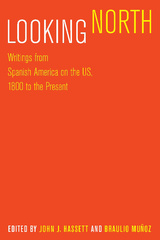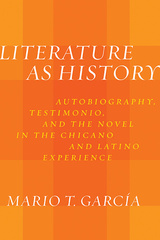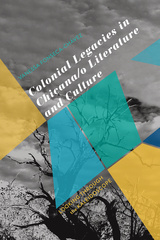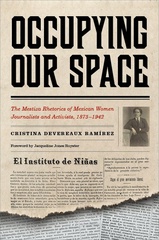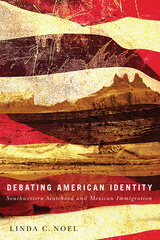230 pages, 6 x 9
none
Paperback
Release Date:03 Oct 2023
ISBN:9780816551842
Hardcover
Release Date:03 Oct 2023
ISBN:9780816551859
Latinos and Nationhood
Two Centuries of Intellectual Thought
The University of Arizona Press
Spanning from the early nineteenth century to today, this intellectual history examines the work of Latino writers who explored the major philosophic and political themes of their day, including the meaning and implementation of democracy, their democratic and cultural rights under U.S. dominion, their growing sense of nationhood, and the challenges of slavery and disenfranchisement of women in a democratic republic that had yet to realize its ideals.
Over the course of two centuries, these Latino or Hispanic intellectuals were natural-born citizens of the United States, immigrants, or political refugees. Many of these intellectuals, whether citizens or not, strove to embrace and enliven such democratic principles as freedom of speech and of the press, the protection of minorities in the Bill of Rights and in subsequent laws, and the protection of linguistic and property rights, among many others, guaranteed by treaties when the United States incorporated their homelands into the Union.
The first six chapters present the work of lesser-known historical figures—most of whom have been consistently ignored by Anglo- and Euro-centric history and whose works have been widely inaccessible until recently—who were revolutionaries, editors of magazines and newspapers, and speechmakers who influenced the development of a Latino consciousness. The last three chapters deal with three foundational figures of the Chicano Movement, the last two of whom either subverted the concept of nationhood or went beyond it to embrace internationalism in an outreach to humanity as a whole.
Latinos and Nationhood sheds new light on the biographies of Félix Varela, José Alvarez de Toledo y Dubois, Francisco Ramírez, Tomás Rivera, Rolando Hinojosa-Smith, and Gloria E. Anzaldúa, among others.
Over the course of two centuries, these Latino or Hispanic intellectuals were natural-born citizens of the United States, immigrants, or political refugees. Many of these intellectuals, whether citizens or not, strove to embrace and enliven such democratic principles as freedom of speech and of the press, the protection of minorities in the Bill of Rights and in subsequent laws, and the protection of linguistic and property rights, among many others, guaranteed by treaties when the United States incorporated their homelands into the Union.
The first six chapters present the work of lesser-known historical figures—most of whom have been consistently ignored by Anglo- and Euro-centric history and whose works have been widely inaccessible until recently—who were revolutionaries, editors of magazines and newspapers, and speechmakers who influenced the development of a Latino consciousness. The last three chapters deal with three foundational figures of the Chicano Movement, the last two of whom either subverted the concept of nationhood or went beyond it to embrace internationalism in an outreach to humanity as a whole.
Latinos and Nationhood sheds new light on the biographies of Félix Varela, José Alvarez de Toledo y Dubois, Francisco Ramírez, Tomás Rivera, Rolando Hinojosa-Smith, and Gloria E. Anzaldúa, among others.
In Latinos and Nationhood, Nicolás Kanellos, widely regarded as the tour de force in the recovery and publication of the Latino/a literary and intellectual traditions in the United States, provides insights and analysis on the significance of over two centuries of struggle Latinos/as have been engaged in in their quest for personhood and pursuits of the mind.’—A. Gabriel Meléndez, author of Hidden Chicano Cinema: Film Dramas in the Borderlands
‘A refreshing look at the topic of Latinos and nationhood by one of the leading scholars in the field. Rigorous yet accessible, this book offers an excellent history of Latino thought, from the nineteenth century to the present, from nationalistic aspirations to embracing life in the borderlands.’—Manuel M. Martín-Rodríguez, author of Life in Search of Readers: Reading (in) Chicano/a Literature
Nicolás Kanellos is the Brown Foundation Professor of Hispanic Literature at the University of Houston. He is the director of Arte Público Press and the founder and director of Recovering the US Hispanic Literary Heritage, a national research project. He is the author of numerous books, including Hispanic Immigrant Literature, Hispanic Literature of the United States, and Thirty Million Strong.



